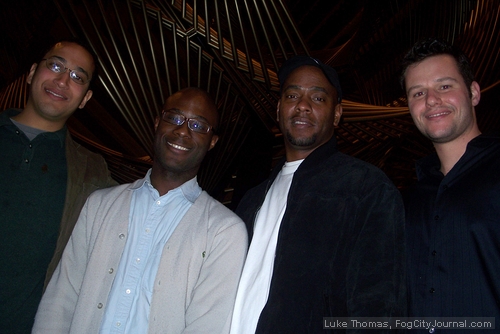By Luke Thomas
March 10, 2009
Armed with a $4,000 camera, a four-person crew, and a production budget that might pay for a new Nissan Sentra, writer/director Barry Jenkins demonstrates in his new movie, Medicine for Melancholy, that low-budget Indie movie making has entered the domain of the masses.
But what makes Medicine for Melancholy a movie worth seeing, especially in San Francisco, is that it weaves issues of race, class, identity and gentrification into a love story.
“I wanted to make a movie that could be both entertaining and politically engaged,” Jenkins said during a Q and A session following the movie’s premier showing at the Landmark Embarcadero Center Cinema in San Francisco on Sunday.
Yes, the film is low beat and raw in its production quality, but it’s an honest movie with poignant dialogue that succeeds in portraying the underlying impacts of gentrification on the psyche of minorities in a city that has seen its black population decimated by redevelopment.
Micah (Wyatt Cenac) and Jo (Tracey Heggins) are the two twenty-something African Americans central to the movie’s plot who meet at a party and have a one-night stand.
In the movie’s opening morning-after scene, there’s a palpable awkwardness when Jo and Micah realize they don’t yet know each other’s names. But, in time, Micah’s pursuit of Jo wins over her affection and the awkwardness is replaced by genuine tenderness. Together, they spend the next few days getting to know each other, visiting a museum (MoAD), a nightclub, attend a meeting of affordable housing activists (led by Tommi Avicolli Mecca), and spend amorous moments in Micah’s Tenderloin studio apartment.
Though Jenkins’ movie is first a love story, there are moments when Micah’s focus on the African American diaspora in San Francisco deliberately interrupts the romantic flow to remind audiences this movie is not only about love.
“You think that because I’m black and you’re black, that we should be together,” Jo responds when Micah laments ethnic minorities are more likely to partner with whites than other ethnic minorities.
In another notable scene, Micah and Jo are enjoying a touching moment on a merry go round at Yerba Buena Center, the site of what once was a thriving working-class neighborhood before it was razed to the ground and gentrified by corporate interests represented by the Bay Area Council and supported by the establishment-connected San Francisco Redevelopment Agency and the San Francisco Planning Department.
“San Francisco is beautiful. You shouldn’t have to be upper-middle class to be a part of that,” Micah says reflecting on San Francisco’s transformation from an altruistic, idealistic working-class affordable community into a monetized, corporatized center for a brave new technology-based economy.

Medicine for Melancholy writer/director Barry Jenkins (2nd from left)
with premier co-hosts Julian Davis, Edward Donaldson (Osiris Coalition)
and Matt Haney (Citizen Hope).
More Info
Tickets and show times here.
Medicine for Melancholy official website.



 The Hunger Site
The Hunger Site
No Comments
Comments for Medicine for Melancholy are now closed.